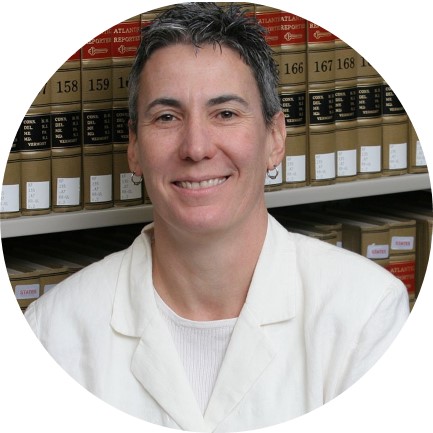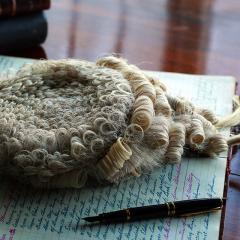The Role of the Married Femme Sole: Deserted Wives, Property and Coverture in the Nineteenth Century
A Nineteenth-Century Legal Unicorn: The Married Femme Sole’s Role in the Breakdown of Coverture and Passage of Married Women’s Property Acts
Time and date: Tuesday 11 May, 2023, 1-2pm (Brisbane Time)
Location: Law School Board Room (W353), Level 3, Forgan Smith Building, The University of Queensland, St Lucia
and via Zoom: https://uqz.zoom.us/j/89661438776
Abstract
In 1857 Parliament created a civil divorce court granting unhappy couples the ability to legally separate and ultimately remarry. Chapter 21 of the Divorce Act also created a new remedy for deserted wives who were maintaining themselves and their children on their own. Under coverture, a married woman could not own her own property, enter into contracts, sue or be sued, or make will. This legal incapacity left deserted wives vulnerable to unscrupulous employers, abusive husbands, and their aggressive creditors because they could not open their own bank accounts, continue businesses by contracting for supplies or hiring employees, or even determine how to expend their own wages. Of course, there were work-arounds when a husband had emigrated and abandoned his family and the wife had to fend for herself, but those work-arounds were particularly vulnerable to abuses. After 1858, however, a deserted wife could obtain an order protecting her separate property and declaring her to be a feme sole for economic purposes despite the fact that her marriage remained intact. Through a close analysis of the petitions filed by deserted wives in the twelve years between the creation of the Divorce Court and the passage of the first Married Women’s Property Act in 1870 we gain valuable insight into the reasons men left, the economic activities their wives picked up, and the effects of the legal incapacities these women faced. This project began with a close analysis of over 200 petitions in the Divorce Court, but will extend through my research in Australia into some of the circumstances that kept these husbands from remitting support to their wives back home, the rates of remarriage by the men who emigrated to Australia, their general economic circumstances, and ultimately whether the cultural trope of the returning husband who magically showed up just as his wife received a legacy, only to take it and disappear again, had any factual basis. Once married women could hold property in their own names, the protective property order would eventually disappear, but its use by a particular class of working women reveals a rich history of women’s economic activities and of the economic hardships that caused men to desert their families. By locating some of these husbands in Australian archives, I hope to be able to better piece together the complicated pressures that caused men to desert and led their wives to seek financial independence when their husbands failed to return.
About the Speaker
 Professor Wright is T. Terrell Sessums and Gerald Sohn Professor in Constitutional Law and Co-Director of the Center for Governmental Responsibility at Levin College of Law, The University of Florida. As a legal historian, her research has delved into 19th century English divorce and marriage law, 19th century American property rights involving railroads and utilities, and women’s rights and constitutional protections in the 19th and early 20th centuries. She has written extensively on recreational trails and rails-to-trails conversions, on the history of English family law, on the Equal Rights Amendment and constitutional takings law in the US, on the logistics of drone delivery systems, and on the necessity for legal reforms in intestacy and probate law to better address land loss and the heirs’ property problem. Her work has been cited by the U.S. Supreme Court and numerous federal and state courts.
Professor Wright is T. Terrell Sessums and Gerald Sohn Professor in Constitutional Law and Co-Director of the Center for Governmental Responsibility at Levin College of Law, The University of Florida. As a legal historian, her research has delved into 19th century English divorce and marriage law, 19th century American property rights involving railroads and utilities, and women’s rights and constitutional protections in the 19th and early 20th centuries. She has written extensively on recreational trails and rails-to-trails conversions, on the history of English family law, on the Equal Rights Amendment and constitutional takings law in the US, on the logistics of drone delivery systems, and on the necessity for legal reforms in intestacy and probate law to better address land loss and the heirs’ property problem. Her work has been cited by the U.S. Supreme Court and numerous federal and state courts.
About Australian Centre for Private Law Events
The mission of the Australian Centre for Private Law is to foster the development and understanding of the private law through advanced theoretical, doctrinal, empirical and historical research, and the dissemination of that research through education and professional outreach. By supporting the work of its Fellows, the ACPL seeks to promote research in all areas of private law and to establish itself as a research centre of national and international importance. The core initiatives of ACPL are:
Research: To advance a deeper understanding of the structure, principles and policies of the private law through advanced theoretical, comparative, and empirical analysis.
Education: To promote, facilitate and disseminate the results of that research for the benefit of Australia’s social and economic fabric.
Professional Outreach: To engage the judiciary and members of the legal profession in discussion about the values, goals and methods of private law and the respective roles of the judiciary, the legal profession and the academy in the interpretation and reform of private law.
The ACPL embraces all branches of private law, including the law of contract, torts, trusts, equity, property, unjust enrichment, including theoretical and jurisprudential dimensions and contextual applications thereof.



